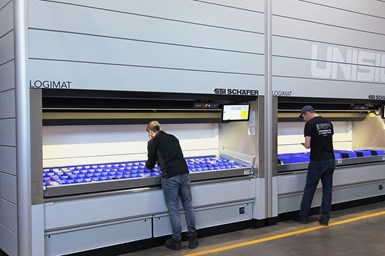Unisig Enhances Parts Inventory Management System
The company has added two new SSI Schafer Logimat vertical lift modules to keep parts organized and optimize inventory tracking.
Share


Autodesk, Inc.
Featured Content
View More.png;maxWidth=45)
DMG MORI - Cincinnati
Featured Content
View More





Takumi USA
Featured Content
View MoreUnisig has commissioned two new SSI Schafer Logimat vertical lift modules (VLM) into its parts warehouse. Integrated with Unisig’s enterprise resource planning (ERP) system, the 20-foot-tall, high-density storage units keep parts organized and optimize inventory tracking.
Touchscreen interfaces at the VLM modules enable personnel to add or remove inventory pieces, while the purchasing team can access real-time data and reports from their desktops. The module’s trays tilt toward the operator for improved ergonomics when reaching into bins located toward the back of the tray, and a laser highlights the correct bin or location of the part requested.
With 28 tons of inventory capacity in their tray systems, the VLMs exponentially increase Unisig’s inventory storage capability. This, in turn, enables the company to provide the spare parts customers need as quickly as possible.
“We continue to seek out and identify areas in which we can improve efficiency as well as operational excellence at Unisig, and this inventory system is a result of that,” says Unisig CEO Anthony Fettig. “It also complements our commitment to having the inventory we need to serve our customers.”
The installation of the inventory warehouse VLMs is the most recent of several significant investments designed to add value to Unisig’s customer offerings. Earlier this year the company unveiled its newly constructed 5,000-square-foot fabrication department. The expansion supports the company’s strategy to develop in-house, design-to-finish production of high-quality sheet metal components used in Unisig’s product line. By producing many of its parts in-house, the company will preserve and maintain component quality and quantity, while optimizing the mix of parts that are made internally versus those that are outsourced for production.























.png;maxWidth=150)















